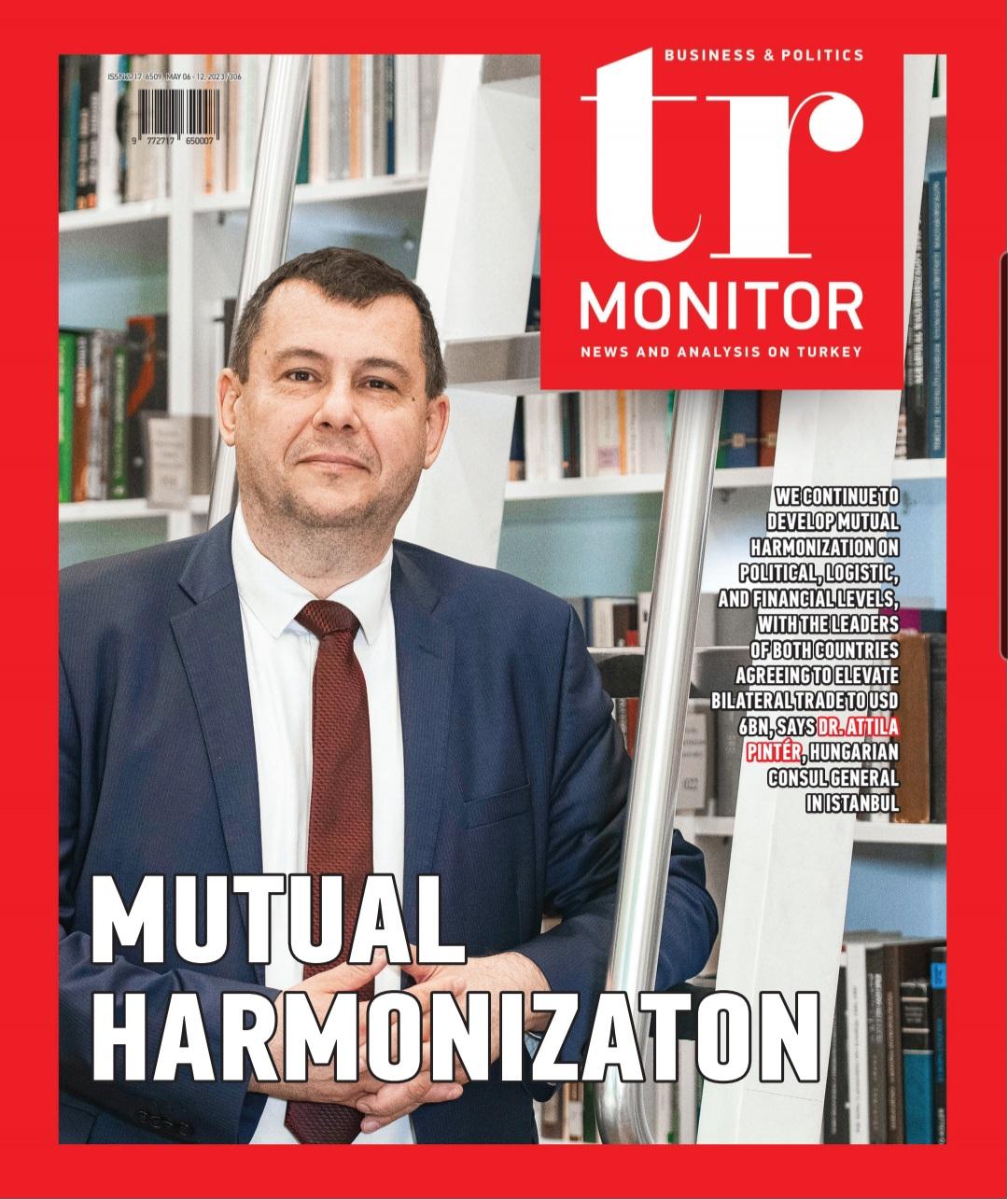BY HUSNIYE GUNGOR
HOW HAS TRADE BETWEEN THE TWO COUNTRIES DEVELOPED IN THE LAST TWO DECADES?
The political and economic relations between Hungary and Turkiye are at a very good level. Hungary-Turkiye bilateral trade hit a new record in 2021. Over the last two decades, the trade turnover between the two countries has increased tenfold. Furthermore, many Hungarian companies have conducted successful business in Türkiye.
The leaders of both countries drew a blueprint for the future development of bilateral relations, agreeing to elevate bilateral trade to a value of USD 6bn, which is a significant goal regarding that trade value was over USD 3bn last year. Despite the negative impact of the pandemic on the economies of Hungary and Türkiye, both countries have managed to maintain economic growth in recent years, increasing the value of trade turnover.
WHAT DOES TURKEY IMPORT FROM HUNGARY AND EXPORT TO HUNGARY? WOULD YOU MAKE A BREAKDOWN OF IMPORTS AND EXPORTS?
Türkiye’s primary export categories include vehicle parts, machinery, iron, and steel, while its most significant import categories are electrical machinery, organic chemicals, plastic, and rubber. Looking at TurkStat data retrospectively and comparing 2022 and 2021 on a USD basis, we see that the bilateral trade volume has increased by nearly 13%. Despite the external adverse effects on the global economy, Hungary could increase its exports by 11%, and its imports have increased by 15% from Turkey.
WHAT DO THE FDI FIGURES TELL US ABOUT THE INVESTMENT ENVIRONMENT OF THE TWO COUNTRIES? HOW HAS THE FDI DEVELOPED RECENTLY?
The increased flows of FDI in both countries indicate that investments are supported by government incentives, and more and more Turkish companies are choosing Hungary as their European hub for several reasons. We anticipate that the current USD 800m worth of Turkish investments in Hungary will reach USD 3bn within the next two years.
WHICH TURKISH SECTORS TAKE ATTENTION FROM HUNGARIAN COMPANIES? WHICH SECTORS HAVE POTENTIAL FOR TURKISH COMPANIES THAT PLAN TO INVEST IN HUNGARY?
Hungary’s advantageous incentives, such as low taxes, a safe business environment, strategic location, and high investment assistance, make it an appealing choice for Turkish companies looking to expand their business activities within the EU, regardless of the area of specialization.
Although the EU presents numerous opportunities for Turkish companies as the world’s largest single market area, the EU-Turkiye Customs Union signed in 1995 is increasingly outdated. In recent years, both parties have introduced unexpected customs and quotas, which can pose a risk to Turkish businesses trading with their EU customers. By establishing a company in Hungary, Turkish investors can avoid such risks.
Hungary offers the lowest corporate tax rate in the EU, which stands at 9%. If Turkish companies invest at least EUR 5m in Hungary, they can apply for both tax and cash incentives. The mix of tax and financial support provided can range up to 50%, depending on the sector, region, and size of the investment. Furthermore, our strategic location in the heart of Europe offers easy access to both Eastern and Western European countries. It is just a two-hour flight away from Istanbul. All these potentials make Hungary an ideal gateway for Turkish companies looking to enter the EU market.
HOW MANY HUNGARIAN COMPANIES HAVE OPERATIONS IN TURKEY AND TURKISH COMPANIES IN HUNGARY?
Due to lower taxes and operating costs in Hungary, most Hungarian companies choose to be represented in the Turkish market through their local distributors. However, there are a few companies with offices in Istanbul, primarily for operational reasons. On the other hand, over 500 Turkish companies are actively engaged in various sectors of business in Hungary.
WHICH TOPICS CONSTITUTE POTENTIAL ECONOMIC AND PO LITICAL COOPERATION OPPORTUNITIES BETWEEN THE TWO COUNTRIES?
Foreign trade, security policy, energy, defense industry, and culture are among the priority areas of cooperation between Hungary and Türkiye. Currently, one of the main focuses is to mitigate the damage caused by the war in Ukraine, and to ensure the security of energy supplies. Another crucial area is the promotion of common positions in international organizations, such as migration challenges. Hungary and Turkiye have established various platforms for political and economic cooperation. The High-Level Enhanced Strategic Cooperation Council is the highest political forum between the two countries, led by the Hungarian Prime Minister Viktor Orbán, and the Turkish President Recep Tayyip Erdogan. The Hungarian-Turkish Joint Economic Commission (JEC) serves as a platform to discuss two main topics: the enhancement of bilateral trade and investment relations and the promotion of economic and technical cooperation between Hungary and Türkiye. On January 16, 2023, the eighth session was held, led by Hungarian Minister of Foreign Affairs and Trade, Péter Szijjártó, and Turkish Minister of Industry and Technology, Mustafa Varank.
WHAT IS THE MOST IMPORTANT COMMON ASSET BETWEEN THE TWO COUNTRIES?
We have achieved and continue to develop mutual harmonization on three levels: political, logistic, and financial. Political harmonization involves supporting trade and trade projects between Hungary and Turkiye at the highest political levels. Logistic harmonization is crucial to facilitate the safe and efficient transportation of goods between the two countries. Over the past few years, many companies have emerged in the market, capable of transferring goods between Hungary and Turkiye daily. The financial harmonization process between Hungary and Turkiye is expected to be completed this year with the opening of VakifBank’s branch in Budapest. This will enable businesspeople to conduct banking transactions in their mother tongue, quickly and securely. With all these processes in place, all boundaries to international trade between the two nations will be removed, allowing for further growth of bilateral trade.
WHAT ARE THE POTENTIAL NEW AREAS THAT THE TWO COUNTRIES CAN COOPERATE IN?
The automotive industry is one of the already flourishing sectors in both countries with promising prospects of cooperation. Hungary recognizes the growing importance of battery production for electric vehicles and is taking steps to remain competitive in this field. While electric cars accounted for only 0.1% of all cars sold in 2011, this proportion had risen significantly to 10% by 2022 and is projected to reach 55% by 2030. As a result of our efforts to encourage FDI, several international electric vehicle manufacturers have chosen Hungary as a destination for establishing large battery factories. Hungary and Turkiye have numerous joint initiatives, both at bilateral and multilateral levels, which underline the dedication of both countries to collaborate on crucial global issues and leverage their expertise and resources to attain shared objectives. In today’s world, a reliable and sustainable energy supply is of utmost importance. Therefore, Hungary and Turkiye have agreed to cooperate and share best practices in various energy-related fields, such as renewable energy, hydrocarbons, exploration of mineral resources, and energy efficiency. The “Go Africa” initiative is a novel collaborative effort between Hungary and Türkiye, aimed at jointly developing trilateral projects in the future. Additionally, the Drought Prevention Institute, a Hungarian initiative under the auspices of the Organization of Turkic States (OTS), aims to mitigate the adverse effects of drought and enhance the resilience of affected nations.
ARE THERE ANY POSSIBLE DIRECT INVESTMENTS FROM HUNGARY IN THE PIPELINE?
The latest Hungarian investment in Turkiye has been made by Medicor, a Hungarian healthcare firm, which is currently building a factory for incubators in Ankara. This is a positive development, and we hope that other Hungarian firms will follow their lead. The Hungarian government is proactively assisting companies in venturing into foreign markets and expanding their production abroad. We are also mindful of Hungarian companies that have established joint ventures in Turkiye and are keen on manufacturing their products here. Furthermore, an increasing number of Hungarian enterprises are setting up their distribution networks in Türkiye, underscoring the growing business ties between the two countries. On the other hand, Hungarian investors often face challenges when trying to comply with the unknown market regulatory environment, the drastic depreciation of the Turkish currency, and the conditions for participating in Turkish public procurement tenders. To address these issues, together with our colleagues, we work to provide comprehensive guidance and support to Hungarian investors, helping them to gain knowledge about Turkish business life and the culture of doing business in Türkiye.
FELL IN LOVE WITH ISTANBUL 50 YEARS AGO
Dr. Attila Pintér, Hungarian Consul General in Istanbul, was appointed for this post in late November 2022. But his first visit to this town he fell in love with was in 1976 when he was 7 years old. “I must admit it was love at first sight and I always wanted to return to this wonderful place. You may ask me about the reasons but frankly speaking, I have no idea why I fell in love with Istanbul almost 50 years ago. Even if I were to ask my parents, they wouldn’t be able to provide a clear explanation either,” he says. Pintér enjoys strolling around the old city in his spare time, when he also likes to read and enjoy sports, with basketball taking first place. “Walking in the city, and discovering new places, including museums, restaurants, and coffee shops, are my favorite activities. What I enjoy very much is crossing the Bosphorus via ferry from BeƔiktaƔ to Karakoy or Kadikoy, then walking a little on the other side of the straits with some tea or beer,” he details. His favorite dish is kebaps and soups, and he became a tea person after he arrived in Istanbul. He also mentions his favorite beer as Efes…










